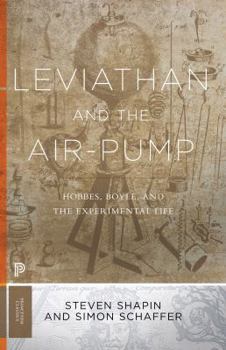Leviathan and the Air-Pump: Hobbes, Boyle, and the Experimental Life
Select Format
Select Condition 
Book Overview
Leviathan and the Air-Pump examines the conflicts over the value and propriety of experimental methods between two major seventeenth-century thinkers: Thomas Hobbes, author of the political treatise Leviathan and vehement critic of systematic experimentation in natural philosophy, and Robert Boyle, mechanical philosopher and owner of the newly invented air-pump. The issues at stake in their disputes ranged from the physical integrity of the air-pump to the intellectual integrity of the knowledge it might yield. Both Boyle and Hobbes were looking for ways of establishing knowledge that did not decay into ad hominem attacks and political division. Boyle proposed the experiment as cure. He argued that facts should be manufactured by machines like the air-pump so that gentlemen could witness the experiments and produce knowledge that everyone agreed on. Hobbes, by contrast, looked for natural law and viewed experiments as the artificial, unreliable products of an exclusive guild. The new approaches taken in Leviathan and the Air-Pump have been enormously influential on historical studies of science. Shapin and Schaffer found a moment of scientific revolution and showed how key scientific givens--facts, interpretations, experiment, truth--were fundamental to a new political order. Shapin and Schaffer were also innovative in their ethnographic approach. Attempting to understand the work habits, rituals, and social structures of a remote, unfamiliar group, they argued that politics were tied up in what scientists did, rather than what they said. Steven Shapin and Simon Schaffer use the confrontation between Hobbes and Boyle as a way of understanding what was at stake in the early history of scientific experimentation. They describe the protagonists' divergent views of natural knowledge, and situate the Hobbes-Boyle disputes within contemporary debates over the role of intellectuals in public life and the problems of social order and assent in Restoration England. In a new introduction, the authors describe how science and its social context were understood when this book was first published, and how the study of the history of science has changed since then.
Format:Paperback
Language:English
ISBN:0691150206
ISBN13:9780691150208
Release Date:September 2011
Publisher:Princeton University Press
Length:448 Pages
Weight:1.50 lbs.
Dimensions:0.9" x 6.0" x 9.3"
Customer Reviews
2 ratings
just what I needed
Published by Thriftbooks.com User , 15 years ago
Came on time and in good condition. I didn't have to wait and there was no hassle.
Interesting analysis,but has an acknowledged pro-Hobbes bias
Published by Thriftbooks.com User , 26 years ago
The authors begin their review of the 17th-century Hobbes-Boyle controversy by declaring their intent to take a strongly pro-Hobbes stance, so it is not surprising that they end by concluding that "Hobbes was right". (About what, is not clear.) Their stated reason for adapting this biased perspective is that the opposite view (that Hobbes was wrong) has been so thoroughly documented that not much new could be added. Only by adopting a "charitable" view of Hobbes, and a critical view of his opponents, could they make a significant new contribution. In other words, they wanted to make a splash, not a ripple.Their bias is expressed by selective omission of information unfavorable to Hobbes. For example, in Hobbes's "Dialogus Physicus", his fallacious solution of the cube-duplication problem has been deleted, without mentioning that it was fallacious. Also, the reader is not informed that a "Torricelli apparatus" and a "mercury barometer" are functionally identical; the height of the mercury column varies with weather conditions. This variability was a problem for Hobbes, but not for Boyle. But it is not mentioned, except in connection with a suggestion that the experimentalists may have fudged their data.Also, the authors should have noted that Hobbes's a-priori rationalist philosophy is not a viable alternative to experimentalism, because it is based on an elementary logical fallacy: you cannot make up definitions and postulates arbitrarily AND claim that deductions from them give certainty about the real world.






